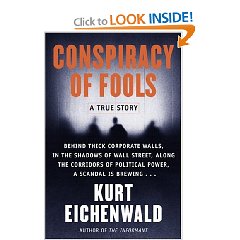1) This author sets the gold standard for investigative journalism and non-fiction authorship. 1000 hours of interviews, 200 three-ring binders, and a gifted ability to communicate extremely complex issues. Perhaps more pointedly, the author shows what a good solid investigation can produce in the way of facts and context and understanding, to the point that one wonders why the government cannot do as well.
2) This book confirms the author's earlier findings as documented in “The Informant,” to wit, the government does not take enforcement seriously, and lets very bad people off with very minor sentences. When combined with the books on “The Cheating Culture,” or “The Soul of Capitalism,” or “Rogue Nation,” what we see is a complete break-down of ethics in business–Wall Street business, not Main Street. Enron, and then WorldCom, are the poster children of greed run amok. The profligacy of Enron is quite amazing—they paid 25% to 100% above the industry average in salaries, and made huge deals with falsified projections of future profit that were used to hemorrhage tens of millions in cash bonuses to key Enron managers.
3) Neither Arthur Anderson nor the government did their jobs. Arthur Anderson “sold out” and as the author concludes, deserved to die a corporate death penalty for its malfeasance. The government, for lack of deep economic understanding among key staffers, allowed itself to be manipulated into opening the door for Enron to cook its books.
The level of detail in this book is extraordinary, and I find that it softens my view of Ken Lay and others in a substantial way. One can see how they were drawn in, how the context led them to make bad uninformed decisions, avoid due diligence, avoid holding corrupt officers to account. This is a deeply human story, full of failings at every turn.
I put the book down reminded of the Long-Term Capital Management (LTCM) scam that stole billions from the public, and then the series of scams outlined in this book. To that one can add the very negative findings outlined in “Crossing the Rubicon,” where the author documents $3 trillion stolen by Wall Street from Main Street and the public.
It is possible to conclude that between the illicit profits of the overtly criminal gangs in the US, and the illicit profits of the covertly criminal Wall Street high-flyers, that the USA is as close to being a narco-crime state as is Colombia or Afghanistan. We have a superficial semblance of order and freedom and good living, but it is a Potemkin Village. We are being hollowed out as a Nation. This book is as close as I have seen to a medical diagnosis of all that is wrong with Wall Street and the very large corporations.





